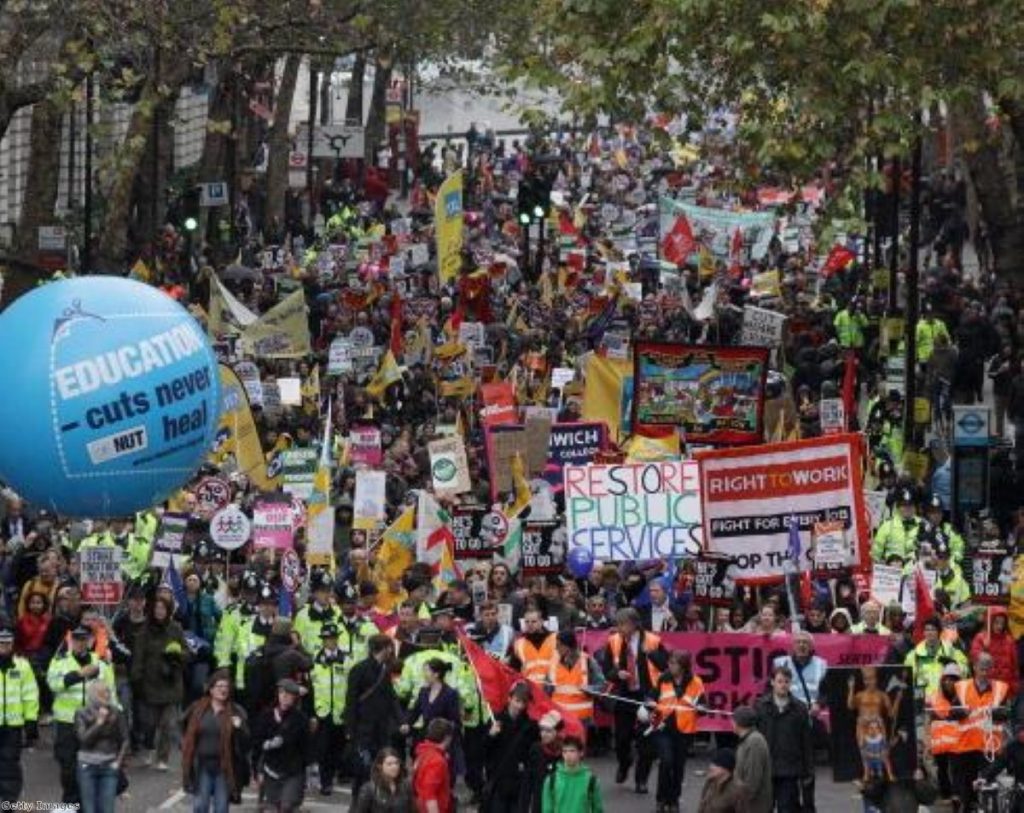‘New atmosphere’ in public sector pensions talks brings deal closer
By Alex Stevenson Follow @alex__stevenson
The coalition is coming close to claiming outright victory over trade unions after the bare bones of an agreement were reached in marathon talks yesterday.
No overall deal has yet been reached, but a series of outline agreements were established which cautious union leaders are taking to their members in the health and local government sectors.
"All the agreements are within the cost ceiling I set in November and will save the taxpayer tens of billions of pounds over the decades to come," chief secretary to the Treasury Danny Alexander told the Commons.


"We and the unions agree this is the best outcome that can be achieved by negotiation. This is the government's final position and we will bring out legislation in due course."
TUC general secretary Brendan Barber described a "new atmosphere" in negotiations since the November 30th strike after ministers succeeded in dividing the unions during negotiations yesterday.
Mr Barber said that unions were now placing their emphasis on giving active consideration to the new proposals, rather than considering the prospect of further industrial action.
"We have been talking for many months but since the day of action that involved millions and with the intensive discussions over recent days we now see change," he added.
The government is offering "more favourable" accrual rates, which determine the pace at which pension pots grow. Health and education workers will receive a "revised revaluation factor" of consumer price index inflation plus 1.5% and 1.6% respectively.
Those nearing retirement and the low paid are also protected.
The increase in the public sector retirement age is still going up to 66, however, and pension contributions are also being increased as previously planned.
Different public sector areas are seeing varying levels of progress. A split has emerged in education unions, with the National Union of Teachers and the NASUWT unions not yet accepting the outline deal.
"There was insufficient progress in terms of the government's position that teachers should work longer, pay more and get less," NUT general secretary Christine Blower said after yesterday's talks.
Its executive will meet in the new year to discuss its "next steps", she added, but insisted the NUT "remains committed to negotiations".
Only in the civil service is there no sign of movement. The Public and Commercial Services union formally rejected the government's offer yesterday after claiming that nothing had changed since the November 30th strike.
The government has offered to revalue each year's contributions by CPI rather than earnings – a move which Mr Alexander conceded costs the same as the government's original offer.
"We continue to oppose the government's attempt to force public servants to pay more and work longer for less," general secretary Mark Serwotka said.
"It is uncontested that all the public sector pension schemes are affordable now and in the future. Public servants should not be forced to pay off a budget deficit caused by the greed and recklessness of bankers and exacerbated by the Tory-led government's economic incompetence."
Cabinet Office minister Francis Maude said he would meet with Mr Serwotka tomorrow morning about a separate issue, as he insisted the government would not make concessions on the fundamentals of its approach.
"What we're not willing to do is reopen the discussions about the basic elements of the scheme design," he told journalists in a Treasury press conference this afternoon.
Most unions accepted the government's proposals and pledged to put them to their members.
"We will now seek our members' views on the offer, and – if they consider it unacceptable – on what action they would be prepared to take," the BMA's chairman of council, Hamish Meldrum, said.
"It is crucial that all doctors and medical students tell us their views. It's their future, their pension, and we want them to have their say."
Moves towards a final agreement come after a year of confrontation between union leaders and ministers over the changes, which were based on proposals put forward by Labour's former work and pensions secretary John Hutton.
"Sometimes the talks have been difficult but it has been right to stay at the table," Mr Alexander told MPs.
"In these difficult times it is right to show people can come together… this is a fair deal for public service workers, an affordable deal for the taxpayer and a good deal for the country."
Shadow chief secretary to the Treasury Rachel Reeves said that ministers had adopted an "aggressive and confrontational approach" which was more interested in "unhelpful megaphone diplomacy" than negotiations, however.
"Last month's strikes could and should have been avoided," she added.
"The government has displayed a similar level of negotiating skill that we saw in the European summit – more interested in going for the cheap headline than putting in the hard graft necessary."









